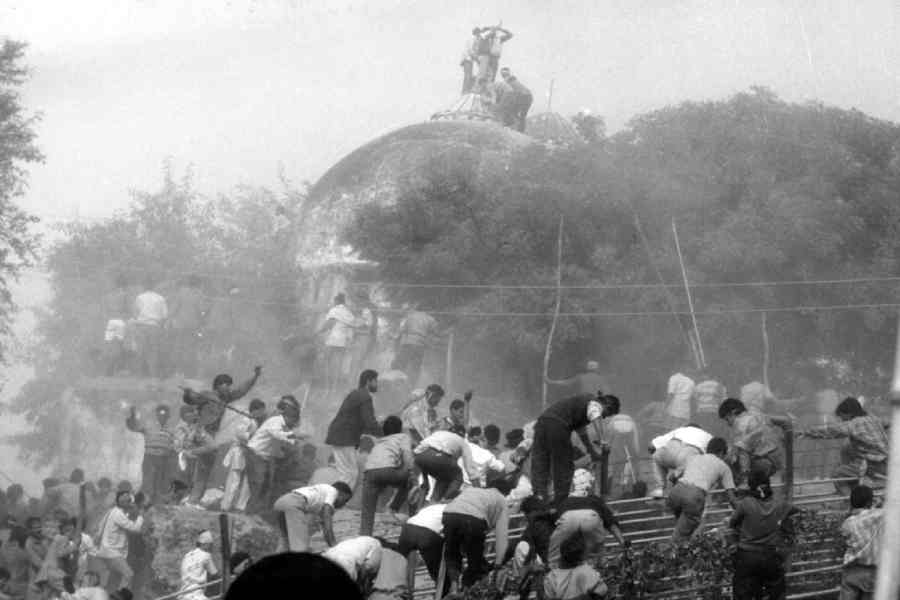The Supreme Court on Thursday restricted courts in the country from passing any orders on disputes relating to places of worship till its next hearing of a challenge to a 1991 law that prevents one religion’s sites from conversion to another’s.
The bench also barred the registration of fresh lawsuits relating to such disputes, at a time when Hindutva groups have been filing cases demanding the handover of the sites of various mosques and dargahs they claim were built after demolishing temples.
The apex court is hearing a raft of petitions challenging or defending the constitutionality of the 1991 Places of Worship (Special Provisions) Act, which bars such handovers by mandating the preservation of the existing character of places of worship.
“We deem it appropriate that fresh suits may be filed, but no suits would be registered and proceedings undertaken till further orders. In pending suits, courts shall not pass any effective interim/ final orders or order (any) survey,” the bench of Chief Justice Sanjiv Khanna, Justice Sanjay Kumar and Justice K.V. Viswanathan directed.
Several lower courts, petitioned by Hindutva groups, have ordered surveys of mosques to ascertain whether they stood over the ruins of temples. One such survey — of the Shahi Jama Masjid in Sambhal town of Uttar Pradesh — led to clashes on November 24 that killed four people.
On Thursday, the apex court also directed the Union government to file within four weeks a counter-affidavit to the batch of petitions and upload it on an official site so that the various litigants can file their rejoinders in another four weeks.
During the hearing, the lawyers for the various claimants said that 18 suits had so far been filed across the country relating to disputed places of worship.
“Will it not be proper that other courts stay hands in the meantime…. No effective orders to be passed including surveys…,” the bench said.
When lawyers representing the Hindu groups objected to such a direction being passed without hearing them, Justice Viswanathan orally observed: “Civil court can’t run a race with the Supreme Court…. There has to bea stay….”
The 1991 law was enacted by the then P.V. Narasimha Rao government during the peak of the Ram temple movement.
Section 3 of the Act bars the conversion of any place of worship of any religious denomination or segment of it into a place of worship for a different religious denomination or a different segment of the same denomination.
Section 4 mandates the preservation of the religious character of a place of worship as it existed on August 15, 1947, with the sole exception of the Ramjanmabhoomi-Babri Masjid site in Ayodhya.
Hindu petitioners led by advocate Ashwini Upadhyay challenged the 1991 law in the apex court in 2020, arguing that by restricting Hindus’ right to reclaim places of worship that had been forcibly converted to those of another religion, it validates alleged vandalism by invaders.
Defenders of the 1991 Act have projected it as the cornerstone of secularism and religious harmony in India.
Solicitor-general Tushar Mehta, appearing for the Centre, told the bench the government had prepared an official email ID on which all the material relating to the issue can be uploaded.
Justice Viswanathan told Mehta: “Mr Solicitor-General, the plea challenges the constitutionality of the Act. There is a larger question involved. One of the arguments you have to meet is Section 3. One view is, it is only an effective reiteration of already embedded constitutional principles.”
The bench agreed with the Hindu side’s plea that it should also examine a provision in Section 4 of the Act that bars judicial review of the validity of the 1991 law by any court.
Sub-clause 2 of Section 4 says: “If, on the commencement of this Act, any suit, appeal or other proceeding with respect to the conversion of the religious character of any place of worship, existing on the 15th day of August, 1947, is pending before any court, tribunal or other authority, the same shall abate, and no suit, appeal or other proceeding with respect to any such matter shall lie on or after such commencement in any court, tribunal or other authority.”
The apex court on Thursday allowed more than a half-dozen fresh intervention applications, moved by the Indian Union Muslim League, Hindu groups and various civil society activists.











